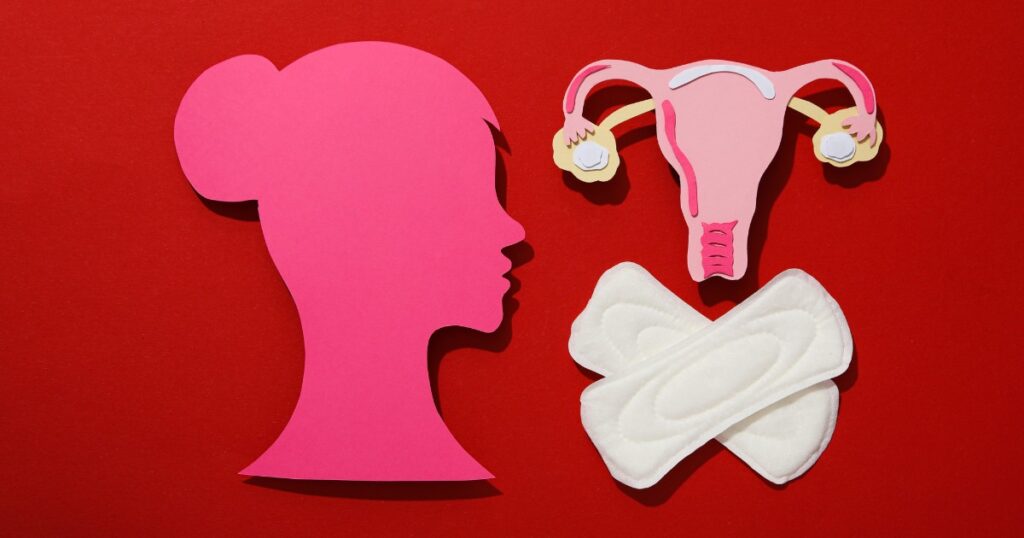What is Menopause?
Menopause is a natural biological process that happens in every woman’s life. Monthly bleeding is a must from menstruation to menopause. However, the final stage of menstruation is called menopause. Menopause marks a woman’s ” Reproduction.”
The levels of female hormones such as Estrogen and Progesterone, which are necessary for a woman’s ovaries to produce eggs, change frequently and do not come according to a monthly pattern. Finally, as the levels of these hormones decrease, periods stop around the age of 40-55. One year If you don’t get your period, you must be in menopause. Some of the symptoms of menopause include hot flashes in the upper body, night sweats, weight gain, mood swings, and problems in metabolism.
The average age of menopause for an Indian woman is 46 years. However, it usually occurs anywhere between the ages of 40 and 55. Menopause shows many physical and emotional characteristics that affect a woman’s quality of life. It can be divided into 3 stages.
1. Perimenopause: In this stage, 5 to 7 years before menopause, some changes in the body begin, and a woman’s ovaries produce less estrogen. This is called “perimenopause.” Irregular periods, hot flashes, and other symptoms are the cause.
2. Menopause: The absence of menstruation for 12 consecutive months is known as “menopause” due to a significant drop in estrogen levels of a woman. Many physical, mental and emotional symptoms appear in this stage
3. Postmenopause (Post Menopause): The stage after menopause that appears at the end of a woman’s life is called “Postmenopause.” During this phase, the symptoms of menopause gradually decrease, and the risk of certain health problems, such as osteoporosis, increases.
Symptoms of Menopause:
Menopause symptoms are not the same for all women. Some have mild or severe problems. Menopause causes many changes in a woman’s body. It can be a bit difficult to distinguish which are signs of aging and which are signs of menopause. These symptoms indicate estrogen production and hormonal fluctuations.
Irregularities in Menstruation:
- Irregular periods,
- The menstrual cycle stops suddenly in some people.
- The long interval between periods.
- Fewer days of bleeding or heavy bleeding can be recognised as signs of menopause
Some other common features are:
- Hot flashes, sweats,
- Headache
- Fatigue quickly during this time,
- Hot flushes. A hot flush is a sudden feeling of heat that spreads throughout the body, causing sweating and skin flushing.
- Insomnia,
- Dryness and thinning of the membrane near the genitals, discomfort in intercourse,
- Urinary incontinence, frequent urinary tract infections,
- Changes in mood,
- Heart palpitations,
- Joint pain, muscle pain,
- Lack of concentration and memory
- Hair loss,
- Problems like excess weight gain
- Doctors recommend hormonal tablets to keep these under control.
Signs of Menopause:
- Irregular Menstruation: Irregular periods are defined as “menopause”.
- Cold Splash: There are two types of cold splash: hot splash and cold splash. Sweating as if in a hot flush. That’s it: in a cold splash, you suddenly feel cold.
- Vaginal dryness: Menopause is caused by a decrease in vaginal lubrication due to tissue shrinkage, leading to pain and discomfort during intercourse.
- Mood changes: Menopause can cause mood changes, irritability, anxiety and depression.
- Sleep disturbances: Menopause causes sleep disturbances, insomnia, and night sweats.
- Urinary Incontinence: Involuntary loss of control over the bladder during sneezing, coughing or laughing.
- Susceptibility to Osteoporosis: Menopause causes bones to become weak and brittle and increases the risk of osteoporosis.
- Weight gain: Menopause can cause weight gain due to hormonal and lifestyle changes.
- Loss of uterus: The ligaments that hold the uterus in place become less rigid, and the uterus is more likely to slip.
Can a woman get pregnant after menopause?
When a person goes 12 months without a period, they are officially in menopause and can no longer ovulate, making natural conception impossible. However, pregnancy is still possible through IVF after menopause using donor eggs or preserved embryos. This method allows those with a healthy uterus to become pregnant, but genetic relationships depend on the source of the egg. A medical evaluation is required, and IVF is generally discouraged for people over 55 or those with health conditions that complicate pregnancy.
Menopause Treatment:
Changes in diet: Menopause symptoms and weight can be controlled by eating balanced, micronutrient-rich, local, traditional food without relying on supplements for changes in the body.
Regular exercise (Exercise is a must): Women should exercise for at least 30 minutes a day to increase strength, power capabilities and flexibility. “Kegels exercises” cause the muscles near the genitals to tighten. By doing this, urinary problems are controlled.
- Resting: Resting is very important as we age. It can prevent many diseases, and the body needs enough rest to recover from the changes.
- Omega Fatty: Including oily fish in the diet, which is rich in omega-3 fatty acids, can overcome the problems associated with menopause.
- Oral tablets to be taken:
- Calcium tablets are something every woman has to take for the rest of her life after menopause.
- Vitamin D tablets should be taken as needed.
- Thyroid, diabetes, BP – these should be controlled using pills.
Conclusion:
Menstruation is a natural process in a woman’s life, from the “starting phase” to the “stopping phase”. However, physical and mental changes are overwhelming during this stage. Before you reach menopause, you should focus on your health. And it should be noted that caution is essential. For that a healthy lifestyle and a balanced diet should be given priority. Making changes in diet and lifestyle, adequate exercise, rest and following the doctor’s advice can relieve the symptoms of menopause.




